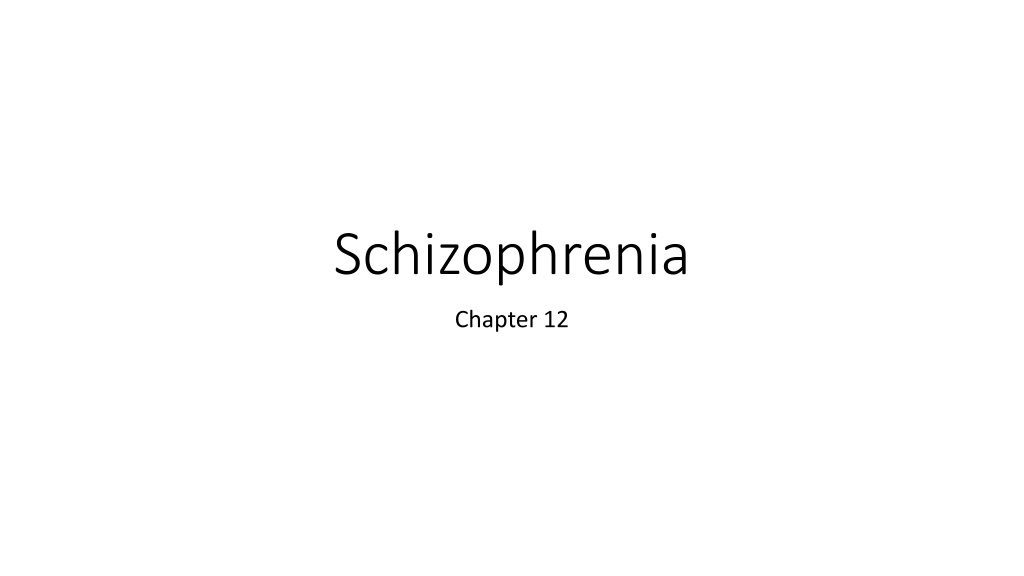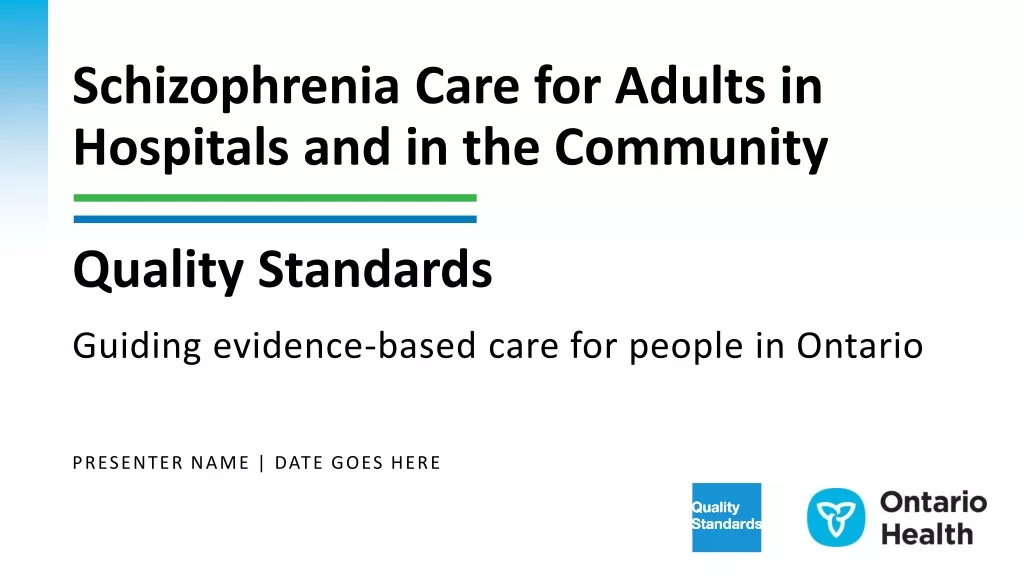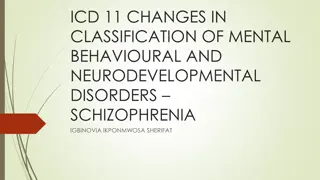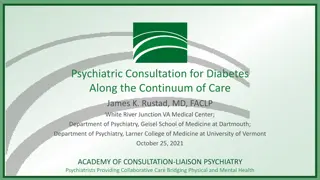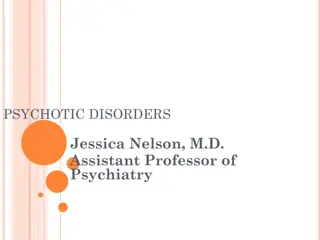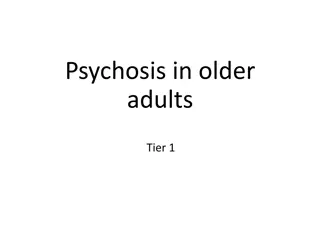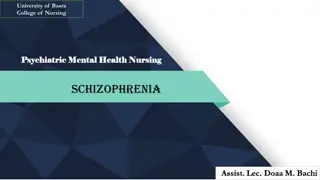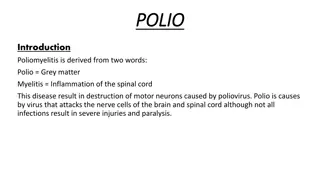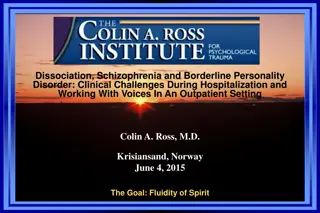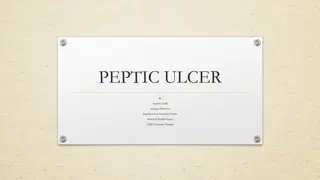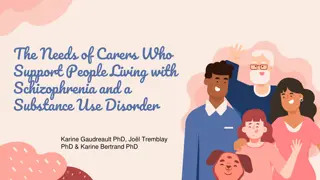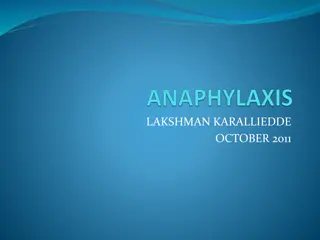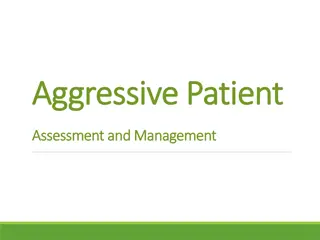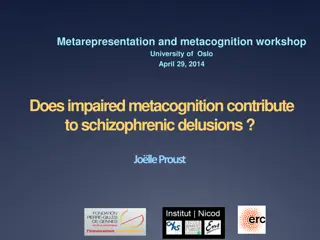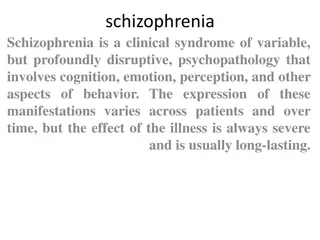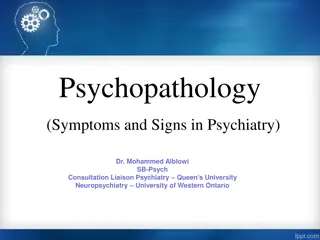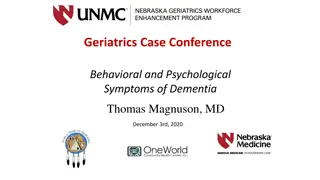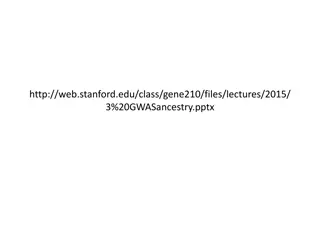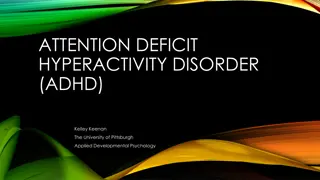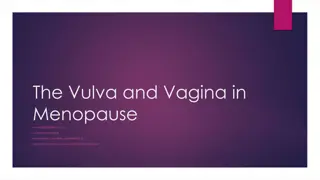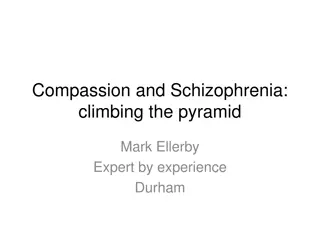Understanding Schizophrenia: Symptoms and Definitions
Schizophrenia is a complex mental disorder characterized by delusions, hallucinations, disorganized speech, and negative symptoms. It involves a significant decline in functioning and must persist for at least 6 months. Common terms associated with schizophrenia include catatonia, paranoia, associative splitting, and psychotic behavior. Symptoms can be categorized into positive (delusions, hallucinations) and negative (avolition, flat affect) symptoms, each contributing to the challenges faced by individuals with this condition.
Download Presentation

Please find below an Image/Link to download the presentation.
The content on the website is provided AS IS for your information and personal use only. It may not be sold, licensed, or shared on other websites without obtaining consent from the author. Download presentation by click this link. If you encounter any issues during the download, it is possible that the publisher has removed the file from their server.
E N D
Presentation Transcript
Schizophrenia Chapter 12
Schizophrenia 2 or more of the following, present for a significant portion of time during a 1-month period, at least one must be delusions, hallucinations, disorganized speech, grossly disorganized or catatonic behavior, negative symptoms Significant portion of time since onset the level of functioning in one or more major areas such as work, interpersonal relations, or self-care is below the level achieved prior to onset Persist for at least 6 months Schizoaffective disorder and depressive or bipolar disorder with psychotic features have been ruled out Not attributable to substance use If ASD- dx if prominent delusions or hallucinations in addition to other required symptoms are present for at least 1 month
Some words that are often used Catatonia- a disorder of movement involving immobility or excited agitation Hebephrenia- a silly and immature emotionality, a characteristic of some types of schizophrenia Paranoia- irrational beliefs that they are especially important (delusions of grandeur) or that other people are seeking to do them harm Dementia praecox- Latin term meaning premature loss of mind; an early label for what is now called schizophrenia- emphasizing the disorder s frequent appearance during adolescence Associative splitting- a separation among basic functions of human personality (cognition, emotion, perception) seen by some as the defining characteristic of schizophrenia Psychotic behavior- hallucinations and loss of contact with reality
Cont Positive symptom- a more overt symptom such as a delusion or hallucination displayed by some with schizophrenia Delusions- a psychotic symptom involving disorder of thought content and presence of strong beliefs that are misrepresentations of reality Hallucination- a psychotic symptom of perceptual disturbance in which something is seen, heard, or otherwise sensed although it is not actually present Negative symptoms- a less outgoing symptom, such as flat affect or poverty of speech, displayed by some with schizophrenia Avolition- an inability to initiate or persist in important activities (apathy)
Cont. Alogia- a deficiency in the amount or content of speech, often seen in schizophrenia Anhedonia- an inability to experience pleasure, associated with some mood and schizophrenic disorders Flat affect- an apparently emotionless demeanor (including toneless speech and vacant gaze) when a reaction would be expected Disorganized speech- a style of talking often seen in people with schizophrenia, involving incoherence and a lack of typical logic patterns Inappropriate affect- an emotional display that is improper for the situation Catatonic immobility- a disturbance of motor behavior in which the person remains motionless, sometimes in an awkward posture for extended periods
Schizophreniform Disorder 2 or more, each present for a significant portion of time during a 1-month period, at least one of these must be delusions, hallucinations, disorganized speech, grossly disorganized or catatonic behavior, negative symptoms An episode lasts at least 1 month but less than 6 months Schizoaffective, depressive, bipolar w/psychotic features ruled out Disturbance not form substance use Specify- Good prognostic features- 2 of the following: onset of prominent psychotic symptoms within 4 weeks of the first noticeable change in usual behavior or functioning, confusion or perplexity, good premorbid social/occupational functioning, absence of blunted or flat affect Without good prognostic features: 2 or more of the above features have not been present
Schizoaffective Disorder An uninterrupted period of illness during which there is a major mood episode (major depressive or manic) concurrent with Criterion A of schizophrenia The major depressive episode must include Criterion A1: depressed mood Delusions or hallucinations for 2 or more weeks in the absence of a major mood episode (depressive or manic) during the lifetime duration of the illness Symptoms that meet criteria for a major mood episode are present for the majority of the total duration of the active and residual portions of the illness Not attributed to the effects of a substance
Delusional Disorder Present of 1 or more delusions with a duration of 1 month or longer Criterion A for schizophrenia has never been met Apart form the impact of the delusions or its ramifications, functioning is not markedly impaired, and behavior is not obviously bizarre or odd If manic or mde have occurred, these have been brief relative to the duration of the delusional periods Not attributable to substance use
Types Erotomanic type-delusion that another person is in love with the individual Grandiose type- delusion of having some great (but unrecognized) talent or insight or having made some important discovery Jealous type- delusion that the individual s spouse or lover is unfaithful Persecutory type- delusion that the individual is being conspired against, cheated, spied on, followed, poisoned or drugged, maliciously maligned, harassed, or obstructed in the pursuit of long-term goals Somatic type- delusions that involve bodily functions or sensations Mixed type- no delusional theme predominates Unspecified type- cannot be clearly determined or not described by the specific types
Others Substance/medication induced Brief Psychotic Disorder Psychotic Disorder associated with another medical condition
